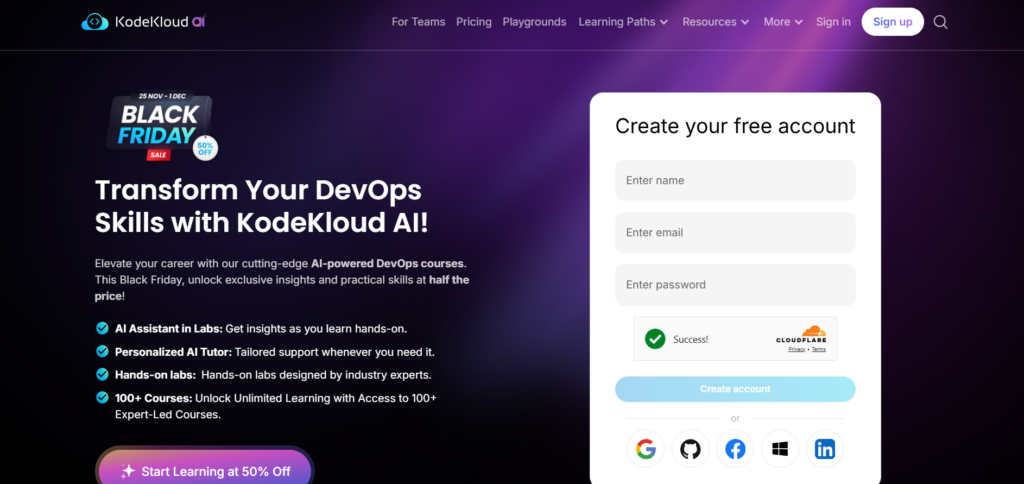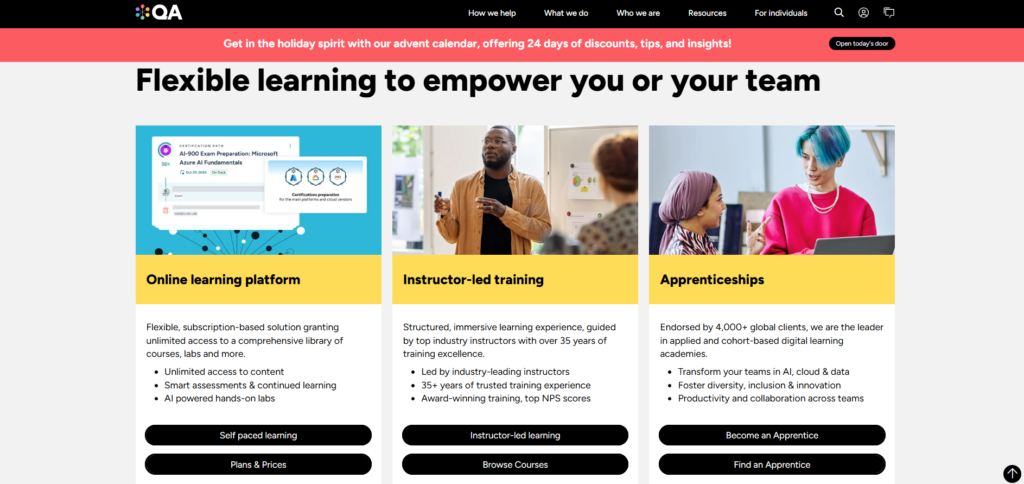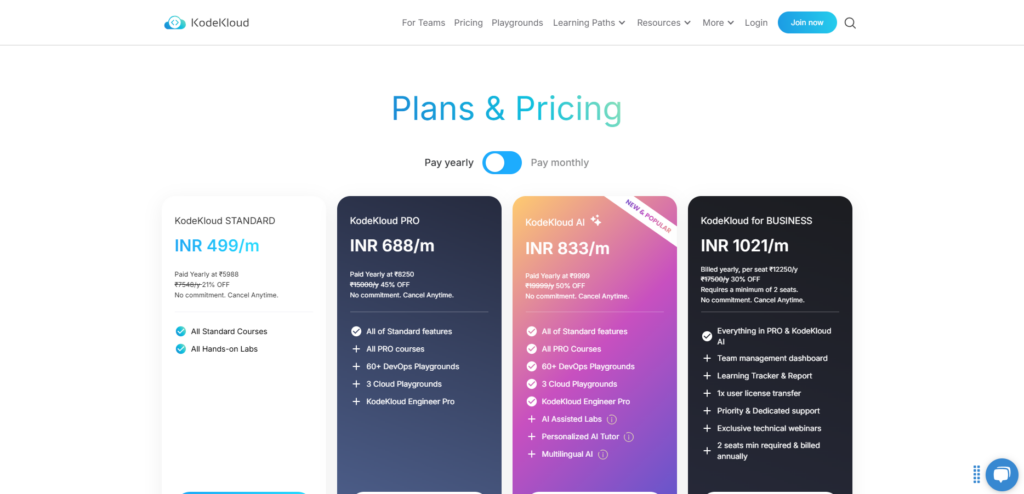Choosing the right platform to build your cloud computing or DevOps skills can feel overwhelming, especially with so many options like Cloud Academy and KodeKloud. I’ve tried both, and each has its strengths depending on what you’re looking for.
Cloud Academy focuses on offering structured learning paths for beginners and professionals. It’s perfect if you want a clear roadmap to earn certifications or improve your skills in AWS, Azure, or DevOps tools.
On the other hand, KodeKloud shines with hands-on labs and practical exercises. It’s great for diving straight into real-world tasks, especially for Kubernetes, Docker, and Linux enthusiasts.
Whether you prefer guided learning or a hands-on approach, both platforms have something valuable to offer. Let’s break down their key features, pricing, and who they’re best suited for to help you pick the right one.
QA (Cloud Academy)
Cloud Academy, now known as QA’s self-paced learning platform, was acquired by QA in July 2019.

Cloud Academy is a comprehensive training platform designed to enhance skills in cloud computing, DevOps, programming, and related technologies.
It offers interactive learning paths, hands-on labs, and certifications tailored to popular cloud providers like AWS, Azure, and Google Cloud.
The platform combines theoretical lessons with practical exercises to bridge the gap between knowledge and real-world application. Personalized learning plans, quizzes, and skill assessments enable individuals and teams to track progress effectively.
Cloud Academy caters to various skill levels, from beginners to advanced professionals, helping users stay competitive in the ever-evolving tech landscape. It’s ideal for career growth and organizational upskilling.
Kodekloud

KodeKloud is an online learning platform that specializes in providing hands-on training for IT professionals in areas like DevOps, Cloud Computing, Containers, Kubernetes, and related technologies.
The platform offers an interactive and practical learning experience through labs, courses, and real-world scenarios, enabling users to build job-ready skills.
KodeKloud’s unique approach focuses on “learning by doing,” making complex concepts easier to understand by providing virtual environments for experimentation.
It caters to beginners and advanced learners, with content covering certifications like Kubernetes CKA/CKAD, AWS, and Terraform. With its user-friendly interface, KodeKloud empowers learners to excel in modern IT roles.
Features Comparison: Cloud Academy vs Kodekloud
Cloud Academy and KodeKloud are prominent platforms offering training in cloud computing and DevOps. Here’s a comparison of seven key features:
1. Course Content:
- Cloud Academy: Provides a broad range of courses covering multiple cloud providers (AWS, Azure, Google Cloud) and various IT domains.
- KodeKloud: Specializes in DevOps and automation technologies, offering in-depth courses on tools like Kubernetes, Docker, and Ansible.
2. Hands-On Labs:
- Cloud Academy: Offers interactive labs to practice skills in real-world scenarios.
- KodeKloud: Features integrated hands-on labs and a “Cloud Playground” for practical experience without additional setup.
3. Learning Paths:
- Cloud Academy: Provides structured learning paths tailored to specific roles and certifications.
- KodeKloud: Offers career-focused paths, guiding learners from foundational to advanced levels in DevOps.
4. User Experience:
- Cloud Academy: Known for a user-friendly interface with progress tracking and assessments.
- KodeKloud: Praised for clear explanations and engaging content, though some users suggest improvements in course organization.
5. Support and Community:
- Cloud Academy: Provides support through various channels, including 24/7 live support.
- KodeKloud: Offers support and has an active community forum, though some users desire more responsive support.
6. Certifications:
- Cloud Academy: Aligns courses with industry certifications across multiple cloud platforms.
- KodeKloud: Focuses on certifications related to DevOps tools and practices.
Why KodeKloud Might Be Preferred:
- Specialization: KodeKloud’s focus on DevOps and automation technologies provides in-depth, specialized content for these areas.
- Practical Learning: Emphasis on hands-on labs and real-world projects enhances practical skills.
- Cost-Effectiveness: More affordable pricing makes it accessible for individuals and small teams.
However, the choice between the two depends on specific learning goals, budget, and desired areas of expertise.
Pricing Comparison: Cloud Academy vs Kodekloud
Cloud Academy Pricing (now part of QA):

1. Individual Plans:
- Monthly: $39 per month, including access to technical content, hands-on labs, quizzes, exams, and practice certification tests.
- Yearly: $399 per year (approximately $33.25 per month), offering the same features at a discounted annual rate.
2. Small Teams:
- $65 per user per month, with additional features like team management, progress tracking, and reporting.
KodeKloud Pricing:

1. Standard Plan:
- Monthly: $15 per month, providing access to all standard courses and hands-on labs.
- Yearly: $180 per year (equivalent to $15 per month), offering the same features with annual billing.
2. Pro Plan:
- Monthly: $30 per month, including all standard features plus access to pro-only courses, DevOps playgrounds, and KodeKloud Engineer Pro.
- Yearly: $360 per year (equivalent to $30 per month), offering the same features with annual billing.
3. Business Plan:
- $28 per user per month (billed annually), encompassing all pro features, team management dashboard, learning tracker, and dedicated support.
Why KodeKloud May Be the Preferred Choice?
1. Cost-Effectiveness:
KodeKloud’s Standard Plan at $15 per month is more affordable than Cloud Academy’s individual plan at $39 per month, making it a budget-friendly option for learners.
2. Specialized Content:
KodeKloud focuses on DevOps and automation technologies, offering in-depth courses on tools like Kubernetes, Docker, and Ansible, which may be more aligned with specific learning goals.
3. Hands-On Learning:
KodeKloud emphasizes practical experience through integrated hands-on labs and playgrounds, facilitating real-world skill development.
While Cloud Academy provides a broader range of content across multiple cloud platforms and IT domains, KodeKloud’s targeted approach, combined with its competitive pricing, makes it an attractive option for those seeking specialized training in DevOps and related technologies.
Conclusion: Cloud Academy vs Kodekloud
Cloud Academy and KodeKloud both excel in IT and DevOps training, but KodeKloud emerges as the winner due to its hands-on, interactive learning approach.
KodeKloud offers scenario-based labs, real-world challenges, and a user-friendly interface that fosters practical skill-building. It is more affordable and focused, making it ideal for learners seeking job-ready expertise in cloud technologies and DevOps tools.
While Cloud Academy provides a broader curriculum, KodeKloud’s targeted content and experiential learning give it a decisive edge.
FAQ’s
Are certifications included with the training?
- Cloud Academy: Aligns training with certifications for AWS, Azure, and other cloud platforms.
- KodeKloud: Focuses on certifications in DevOps tools and practices like Kubernetes and Docker.
Why is KodeKloud considered better for DevOps?
KodeKloud’s specialized content, affordable pricing, and practical, hands-on approach make it a superior choice for mastering DevOps tools and technologies efficiently.
Which platform is better for team training?
- Cloud Academy: Offers robust team management features like analytics, reporting, and content customization.
- KodeKloud: Provides affordable business plans with team dashboards and progress tracking, suitable for DevOps teams.
Can beginners use these platforms?
Both platforms are beginner-friendly, but:
- Cloud Academy: Suitable for broader beginners in IT and cloud computing.
- KodeKloud: Best for beginners focused on DevOps.
How do the platforms differ in course variety?
- Cloud Academy: Covers diverse topics, including programming, security, and multiple cloud platforms.
- KodeKloud: Concentrates on DevOps tools and automation, with fewer topics outside this domain.


